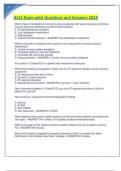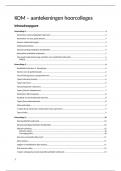THE RIGHT TO RESPECT FOR PRIVATE AND FAMILY LIFE AND THE
RIGHT TO MARRY
The right to respect for private and family life
Explain the terms ‘private life’ and ‘family life’ as used in Article 8.
Private life
Private life is the right to privacy, the right to live as far as one wishes,
protected from publicity. The Commission has the opinion that the right to
respect for private life doesn’t end there. It comprises also the right to
establish and develop relationships with other human beings especially in
the emotional field, for the development and fulfilment of one’s own
personality. It’s only between human beings and it’s not only within your
home but also professional duties and such things.
Does that mean that everything is private life? Or are there limits? The
observation of individuals in public as such is not a violation of your
private life, but when those images are stored or used it is a violation of
your private life.
Family life
Marckx case: In relation to children, family life exists between children and
their parents from the moment of the child’s birth. The family ties exist
even where the parents are not living together at the time of the child’s
birth. Only in exceptional circumstances will this bond between parent and
child be broken and family life cease to exist.
There usually is no family life between adult children and their parents.
Only when there is special dependency, for example people with a
disability. For example students when parents pay their study and housing,
they are not dependent.
Do you have to live together to have family life? For example the L.A.T.-
relationship: you both have your own apartment but most of the time you
stay together, but on some occasions you don’t. You can also have a
family life then.
- Married couples. Not necessary to live together to have family life.
- Unmarried couples. There can be family life, if you can show that there
is a stable relationship. The Court looks at this kind of facts: length of
the relationship, sort of commitment, children, living together.
- Same sex couples can have a family life too.
See ECHR Vallianatos and Others v. Greece. The government made a
distinction between couples who live together and couples who don’t live
together. The Court said that in this case the government should look at
the stability in the relationship (for example financial commitments
between persons in a relationship for professional or social reasons).
, Grandparents and grandchildren, do they have family life? If they have to
take care of the children and there is some sort of commitment, there is
family life. But in principle there is no family life in this case.
Which positive obligations have been established by the Court under
Article 8 ECHR?
Positive obligations under Article 8 can arise in two types of situations. The
first is where a Contracting Party must take some action to secure respect
for the rights included in the Article, as distinct from simply refraining from
interfering with the rights protected (f.e. immigration cases to reunite a
family or that in rape cases there has to be a criminal offence). The second
type of situation is where a duty arises for a Contracting Party to protect
an individual from interferences by other individuals. In principle rules of
government are written for a vertical situation, so between government
and civilian, but sometimes they have to protect civilians and use the
horizontal situation (f.e. ECHR Van Kück v. Germany).
List all the questions - in the right order - that must be answered in order
to determine
whether Article 8 has been violated.
1. Is Article 8 applicable? Does it fall under the scope of Article 8?
2. Is there an interference?
3. Can this interference be justified? Requirements (paragraph 2)
a. Legal basis
b. Foreseeable
c. Accessible
d. Necessary in a democratic society pressing social need
e. Legitimate aim
See S. and Marper v. UK for this structure. About DNA material. Negative
obligation, has there been an obligation with a right?
See Christine Goodwin v. UK for a positive obligation. She couldn’t
legally reassure her gender change. She didn’t get a new ID card or
something like that. If she would complain about a negative obligation,
would that help her? No, she wanted a positive obligation of the State to
make the legal recognition possible. The Court is then looking at the
obligation of the state. In this case there was only a negative obligation, so
a positive obligation couldn’t be found in national law at first. But to find a
positive obligation there has to be a fair balance. The Court then is
weighing interest of the interest of the applicant and at the other hand the
interest of the community. Does it bring a big burden with it for the public?
Conclusion: Yes, the State failed because after weighing interests it
appeared that the State failed to comply with a positive obligation.
Case
What kind of guarantees does Italy have to offer? See ECHR S and
Marper v. UK. The police kept DNA of persons who weren’t convicted and












